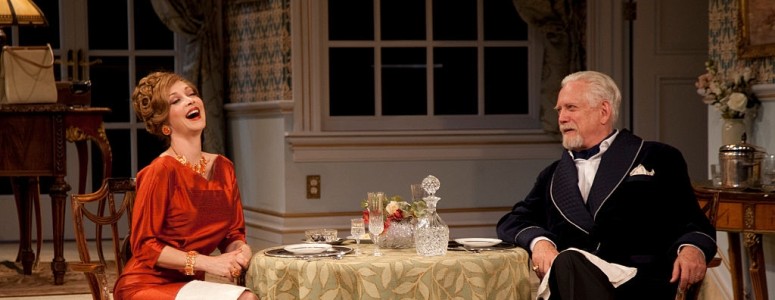How many times have you read that a certain theater company is a “best-kept secret?”
Well, yes and no where The Shakespeare Theatre of New Jersey is concerned. Plenty of savvy theatergoers in the tri-state region have long made their way to Madison, New Jersey, where Bonnie J. Monte’s troupe has been flourishing for decades.
Actually, this is the start of the theater’s 54th season, after its humble beginnings in 1963 in faraway Cape May. Its 1972 journey from Exit One on the Garden State Parkway all the way to Exit 142 is a metaphor for how far it’s come. Yes, the McCarter Theatre in Princeton and now The Paper Mill Playhouse in Millburn have each won a Tony as the nation’s Best Regional Theatre, but one of these days, Monte’s organization is sure to be responsible for a New Jersey triple crown.
The season opener (with six attractions to go) is Noel Coward’s 1966 play A SONG AT TWILIGHT. It tells of Sir Hugo Larymer, an esteemed author who’s been married to Hilde for a while, but now will be visited by Carlotta, a faded star who once appeared in his plays — and bed. Sir Hugo expects she’ll want to borrow money, and while her issue does turn out to involve pounds and pence, it won’t remotely be in the way that Sir Hugo assumed.
Whether or not The Shakespeare Theatre of New Jersey is a best-kept secret, Sir Hugo has one. If he’d ever let it out, instead of receiving a knighthood he’d be spending his nights and days in prison. Hilde has always known the truth about her husband, but she’s been dutifully quiet about it.
Thus, the condescension that Edmond Genest’s Sir Hugo initially gives to Carlotta turns into the type of nervousness that Arnold Stang would have had if he met Arnold Schwarzenegger in a boxing ring. Genest subtly tries to hide Sir Hugo’s worst fears, lest his lose his dignity, freedom and, as Carlotta tartly puts it, “your carefully sculptured reputation.” To see him carefully calibrate an arduous journey from an above-it-all-urbanity to a jumble of nerves reinforces how an excellent actor works.
As Carlotta, Laila Robins is perfection. True, “perfection” means “the condition, state, or quality of being free from all flaws or defects,” and it all-too-rarely applies to matters theatrical, more’s the pity. But here no other noun applies as – well, perfectly.
Watch Robins when Sir Hugo leaves the room and she takes out a mirror. Ostensibly Carlotta is checking her make-up, but she’s doing substantially more than that: she’s seeing which of her many faces will provide the most alluring looks that she can give Sir Hugo upon his return. When he does, she flirts with him but doesn’t cross a line that would make her look silly.
Just as we assume that Carlotta is all style and grace, we see that she can let her hair down, too. Not literally; there won’t be a strand out of place all night long. But after Robins takes a generous swig of vodka, she’ll raise her arms as high as an NFL referee who’s calling an unexpected touchdown. Last but not necessarily least, Robins looks smashing in the yellow dress that Nikki Delhomme has designed for her.
For a while, Hilde seems to be a thankless role, one there mostly for comic relief. Thus we’re not surprised that after a few perfunctory exchanges with Sir Hugo she takes her leave as soon as Carlotta arrives. When Hilde returns, however, she’ll have a great deal to say. Alison Weller says it with great eloquence, measuring her words and pauses with consummate skill.
Because it’s a relatively short play, able director Paul Mullins gives the Madison theatergoers a little lagniappe. He has Ben Houghton, who plays a servant, play the piano and a few Noel Coward ditties, too. He also sings them, in the appropriately elegant and effete voice.
Audiences might immediately be able to tell that the play is 50 years old, and not just because there’s a good deal of smoking on stage. The issues that must have unnerved London theatergoers (and, for that matter, 1974 New Yorkers when the show reached our shores) have long since been put to rest by much of the populace.
Some theatergoers will fear that any 1966 play that took place in “Time: Now” then must automatically be dated. That’s not the point; A SONG AT TWILIGHT has great value in showing us see how far we’ve come. Some peoples’ changes in consciousness may have taken them a half-century to see the light, but there’s no question that a plays such as this helped move many of us out of the dark.




